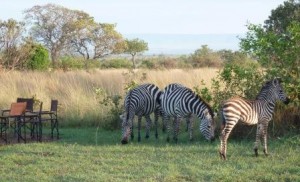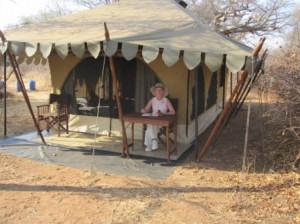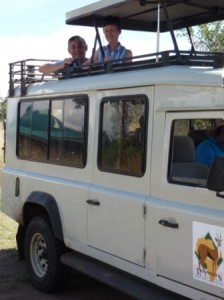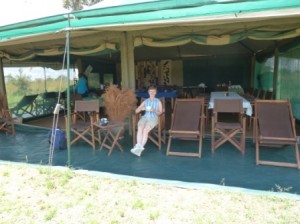
Zebras munched on grass all day and all night around our tents.
Zebras grazing at our doorstep each morning, sun warming our tent, long golden grasses gracefully bowing in the breeze, sky changing color as dusk approaches, lions roaring during the night – this is camp life while on safari. We loved every minute of it!

Zebras munched on grass all day and all night around our tents.

Relaxing outside our nyumba.
The tents were comfortable, and we liked the fact that the camps were eco-friendly. That means the safari camps were gentle on the environment.

Relaxing outside our nyumba.

Inside the nyumba was clean and comfortable.
There were solar panels for a small amount of lighting in the tents. The panels absorbed the heat from the sun and turned it into electricity. There was just enough for a few lights, but there were no electrical outlets to plug in a hairdryer or computer. A kerosene lantern was placed outside each tent at night so the guests could find their way to their nyumba (Swahili word for home) from the dining tent.

Inside the nyumba was clean and comfortable.

There was separate water for drinking and for washing.
There was no running water in the camps. The workers had to drive a truck several miles to fill barrels with water. But this water was just for washing (with soap that would decompose). It was not clean enough to drink. The guests had to drink bottled water. The bottles were taken back to town for recycling. Other trash was burned so it wouldn't attract animals.

There was separate water for drinking and for washing.

Local Tanzanian workers at one of the camps.
Some think people shouldn't be allowed in the Serengeti area at all for fear of disturbing this animal habitat. The advantage of having the safaris is twofold: 1) People become educated about the animals and what's needed to protect them; 2) Tanzania is a very poor country and needs the money that tourists bring. Some of this money is used to hire the guides and camp workers, giving jobs to local people. That way they have money to buy food, rather than killing the animals for food. Some of the money also pays the National Park Service to protect the land and the wild animals.

Local Tanzanian workers at one of the camps.

Robert with Pringles duck lips!
Robert was our safari guide. He's a Tanzanian who grew up in the area. He's VERY knowledgeable about the animals. He went to a special school to learn about the animals and the local ecosystem. He told us lots of interesting information about their social groups and how the different animal species think.

Robert with Pringles duck lips!
He's worried about the climate changing, as well as people taking more and more land for buildings. He works hard to educate people about the animals and what they need so they won't become extinct. Robert was also fun-loving and had a good sense of humor. We were very glad to be in his group.

There was good viewing from the top of the safari truck.
We spent all day, every day, in the safari truck looking for animals. It's too dangerous to walk around because you never know when a hippo or buffalo, or some other animal might come along. If it's scared, or angry, or protecting its young, it might charge you.

There was good viewing from the top of the safari truck.

Tourists had to stay inside their safari truck. The animals were wild, not tame, and could attack if scared or angered.
The safari truck had a top that could open up so we could look out the top. By afternoon we had all of the windows open as well because it was so hot. There's no air conditioning in safari trucks!

Tourists had to stay inside their safari truck. The animals were wild, not tame, and could attack if scared or angered.

A hyrax has joined the tourists for a rest at a picnic area.
At lunch we were driven to special picnic areas patrolled by rangers where we could get out of the truck to walk around a bit.

A hyrax has joined the tourists for a rest at a picnic area.
By early evening we were all tired, very dusty, and ready to head back to camp. For the guests to take a shower, the camp workers heated water over a fire, poured it into buckets, and then attached each bucket to a tube. When the bucket's empty your shower's over! Watch this video to see this clever system.

Relaxing with a cup of tea in front of the dining tent: "This is the life!"
It was a very relaxing couple of weeks, with no work, no responsibilities, and incredible sights to see every day. I hope you get to experience it one day.

Relaxing with a cup of tea in front of the dining tent: "This is the life!"
Do you think YOU would like to go on safari? What do you see as the pros and cons?
The sun sets on the Serengeti Plain in Tanzania, Africa.

Wow! it sounds so exciting!
Wow! it sounds so exciting!
It lookes koze in there I want to go I am KYLE.B.
It lookes koze in there I want to go I am KYLE.B.
wow thats awsom camp site
I haven't ever seen any sunset as beautiful as that picture!!!
I haven't ever seen any sunset as beautiful as that picture!!!
Don't the animals ever get scared and how do you keep so quiet?
Yes, the animals would be scared if the people got too noisy or got too close to them. The zebras that came to camp to eat the grass had come around a lot, so they were kind of used to people. They wouldn’t let us get too close, but if we were quiet and walked slowly, they let us get close enough to get a good picture! 🙂
Wow this is how you get water for the shower! Is it hard to live in a small village like that? What do you eat every night?
These were tents set up by the safari company for the tourists on safari. We stayed in a safari camp for two nights before making a long drive to the next safari camp and a new ecosystem. The dinners they served were always very good. There was often a beef or lamb or chicken stew, along with potatoes, and cooked vegetables.
Wow this is how you get water for the shower! Is it hard to live in a small village like that? What do you eat every night?
Awesome tent
That is really cool! The sunset is beutiful! 🙂
so cool
Agree!